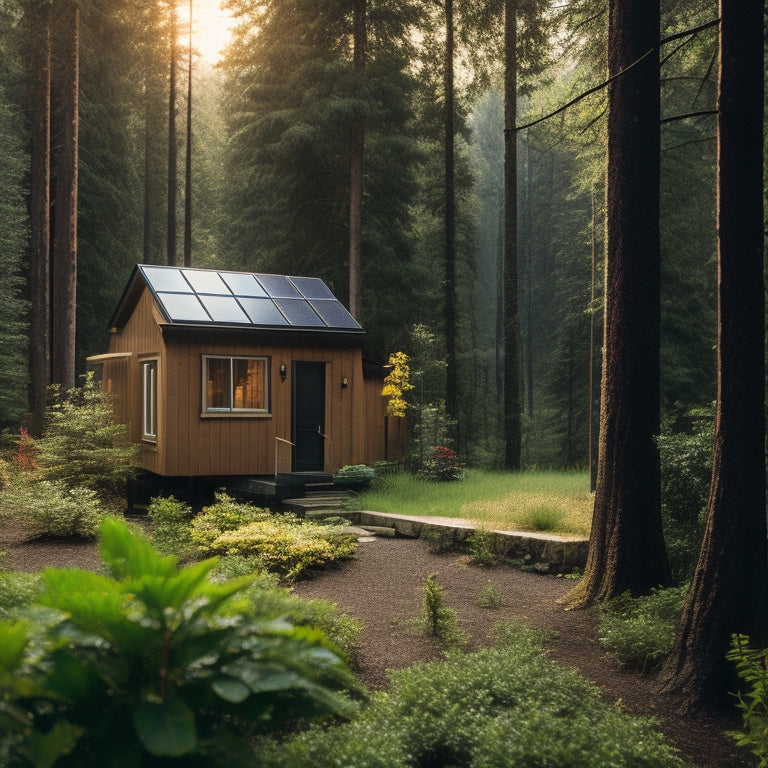
Powering Your Cabin With Off-Grid Battery Systems
Share
To power your cabin with an off-grid battery system, you'll need to determine your daily energy requirements, considering appliances and peak power needs. Choose the right solar panels, evaluating efficiency, durability, and warranty. Select suitable batteries, such as deep cycle, lithium-ion, or flooded lead acid, based on your needs and budget. Design a system that takes into account seasonal variations, and guarantee proper installation and configuration of solar panels and batteries. Regularly monitor and maintain your system to optimize performance and extend its lifespan. As you move forward with your off-grid project, you'll uncover more nuances to optimize your energy independence.
Key Takeaways
• Determine daily energy requirements by calculating total daily energy load and considering peak and average power requirements of appliances.
• Choose the right solar panels by considering panel efficiency, seasonal variance, temperature coefficient, durability, and warranty for optimal recharge.
• Select the suitable battery type, such as deep cycle, lithium-ion, or flooded lead acid, based on energy needs, cycle life expectancy, and maintenance requirements.
• Design an off-grid system by calculating daily energy consumption, performing load calculations, and accounting for seasonal variations in energy usage.
• Ensure proper installation and maintenance of the system by monitoring key metrics, performing routine inspections, and updating the system regularly.
Understanding Off-Grid Energy Needs
When designing an off-grid battery system, you must first determine your daily energy requirements, which depend on the type and number of appliances you plan to power. This is where energy auditing becomes pivotal - an essential step in understanding your off-grid energy needs.
You'll need to calculate your total daily energy load, taking into account the wattage and usage hours of each appliance. This is known as load calculation.
To get an accurate calculation, you'll need to take into account both the peak and average power requirements of each appliance. For instance, a refrigerator may require a higher peak power during startup, but its average power consumption is lower during normal operation.
By adding up the energy requirements of all your appliances, you'll get your total daily energy load. This information is vital in sizing your off-grid battery system, including the number and type of batteries, solar panels, and other components.
Accurate energy auditing and load calculation ensure that your system is designed to meet your energy needs, preventing undersizing or oversizing, which can lead to system inefficiencies or even failure.
Choosing the Right Solar Panels
With your daily energy load calculation in hand, you can now select the right solar panels to effectively recharge your off-grid battery system.
When choosing solar panels, take into account the panel efficiency, which is the percentage of sunlight converted into electricity. Higher efficiency panels are more expensive, but they occupy less space and produce more power per unit area. However, they may not always be the best option, as the increased cost may not justify the slight increase in efficiency.
Another important factor to contemplate is seasonal variance. Since the sun's angle and intensity vary throughout the year, your solar panel system should be designed to accommodate these changes. A system that can adapt to these variations will guarantee a consistent energy supply throughout the year.
Look for panels with a high temperature coefficient, which indicates their ability to perform well in hot temperatures. Additionally, take into account the panel's durability and warranty offered by the manufacturer.
Battery Types for Cabin Systems
When choosing a battery type for your cabin system, you'll need to take into account factors like cost, maintenance, and performance.
You'll have three primary options to choose from: deep cycle batteries, lithium-ion batteries, and flooded lead acid batteries.
Each type has its strengths and weaknesses, and understanding their differences will help you make an informed decision for your off-grid energy needs.
Deep Cycle Batteries
You'll typically choose deep cycle batteries for your cabin system because they're designed to provide a steady flow of energy over a long period, making them ideal for off-grid applications. These batteries are built to handle the demands of daily energy use, and their design allows them to recharge repeatedly without losing capacity.
When selecting deep cycle batteries, consider their Cycle Life Expectancy, which refers to the number of charge and discharge cycles they can handle before capacity drops. A higher cycle life expectancy means your batteries will last longer and provide more reliable energy.
To get the most out of your deep cycle batteries, follow essential Battery Maintenance Tips. Regularly check electrolyte levels, maintain proper charging, and avoid deep discharging to prolong their lifespan. Additionally, keep your batteries in a cool, dry place, away from extreme temperatures and moisture.
Lithium-Ion Options
Lithium-ion batteries, a popular alternative to deep cycle batteries, offer a more efficient and compact energy storage solution for your cabin system. As you weigh the benefits and drawbacks of lithium-ion batteries, you'll want to take into account their advantages and disadvantages.
On the plus side, lithium-ion batteries boast higher energy density, longer lifetimes, and faster charging times compared to traditional deep cycle batteries. However, they also come with higher upfront costs and require more sophisticated management systems to guarantee safe operation.
When it comes to lithium-ion batteries, safety is of utmost importance. You'll need to evaluate factors such as:
-
Thermal management: Lithium-ion batteries can be prone to overheating, so it's crucial to implement proper cooling systems.
-
Electrical protection: You'll need to make sure your system can detect and respond to electrical faults to prevent damage or even fires.
-
Recycling plans: With the growing demand for lithium-ion batteries, it's important to take into account the environmental impact of their disposal and the significance of responsible ion recycling practices.
Flooded Lead Acid
Flooded lead acid batteries, a classic choice for cabin systems, offer a cost-effective and well-established energy storage solution that's hard to ignore. As you consider this option, you'll appreciate the lower upfront cost compared to other battery types. However, it's crucial to weigh this against the need for regular cycling maintenance to guarantee peak performance and extend the battery's lifespan.
When it comes to charging, you'll want to implement charging protocols that prevent overcharging, which can reduce the battery's capacity. You can achieve this by using a charger with a built-in float mode or by installing a charge controller that regulates the charging process. Additionally, you'll need to monitor the battery's state of charge and adjust your charging schedule accordingly.
While flooded lead acid batteries require more maintenance than other options, they remain a reliable choice for off-grid systems. By understanding their unique requirements and implementing proper charging protocols, you can enjoy a cost-effective and efficient energy storage solution for your cabin.
Designing an Off-Grid System
When designing an off-grid system, it's crucial to identify your energy needs by calculating your daily energy consumption in watt-hours (Wh) to determine the required battery capacity and system configuration. This essential step is known as system sizing. To get it right, you'll need to perform load calculations, taking into account the power requirements of each appliance, lighting, and other devices in your cabin.
Here are some key considerations for system sizing and load calculations:
-
Account for peak power: Calculate the maximum power required by your appliances and devices, considering startup surges and simultaneous usage.
-
Factor in energy efficiency: Consider the energy efficiency of your appliances and lighting to minimize energy waste and optimize your system.
-
Plan for seasonal variations: Adjust your calculations to accommodate changes in energy usage patterns throughout the year, such as increased lighting during winter months.
Installing Solar Panels and Batteries
When installing solar panels and batteries, you'll need to select the right solar panels for your off-grid system. This involves considering factors like wattage, voltage, and durability. You'll also need to configure your battery bank to make sure it can store enough energy to meet your daily needs.
Solar Panel Selection
You'll need to carefully select solar panels that match your off-grid system's energy requirements, taking into account factors such as panel efficiency, durability, and compatibility with your battery bank and charge controller.
When selecting solar panels, it's important to take into account the following key factors:
-
Efficiency ratings: Look for panels with high efficiency ratings (>20%) to maximize energy production per unit area.
-
Panel durability: Assess the panel's construction, materials, and warranty to make sure it can withstand harsh environmental conditions.
-
Compatibility: Make sure the panel's voltage and current output are compatible with your charge controller and battery bank.
Choosing the right solar panels will have a significant impact on your off-grid system's performance and reliability. By considering these factors, you'll be able to generate sufficient power to meet your energy needs.
Battery Bank Configuration
Setting up your battery bank correctly is essential to guaranteeing your off-grid system operates efficiently and reliably, as it directly impacts the overall performance and lifespan of your energy storage system.
When configuring your battery bank, you'll need to take into account bank sizing, which involves determining the total capacity of your battery bank based on your energy needs. This calculation will help you determine the number and type of batteries required.
Proper battery wiring is also vital to ensure safe and efficient energy flow. You'll need to decide on a wiring configuration, such as series, parallel, or a combination of both. Series wiring increases voltage, while parallel wiring increases capacity.
A well-designed battery bank configuration will optimize your system's performance, reduce energy losses, and prolong the lifespan of your batteries. By carefully planning your battery bank configuration, you'll be able to enjoy a reliable and efficient off-grid energy system that meets your needs.
Monitoring and Maintaining Systems
Regularly inspecting and testing your off-grid battery system is crucial to guarantee peak performance, identify potential issues, and prevent unexpected downtime.
You'll want to keep a close eye on your system's performance to make certain it's running efficiently and effectively. This involves monitoring key metrics such as battery state of charge, voltage, and temperature.
To maintain top performance, you should:
- Perform regular system updates to make sure you have the latest features and security patches
- Analyze performance analytics to identify areas for improvement and optimize system configuration
- Conduct routine inspections to detect and address any potential issues before they cause downtime
Cost-Effective Off-Grid Solutions
Implementing cost-effective off-grid solutions is essential for reducing overall system expenditures and maximizing your return on investment. As you explore options for powering your cabin, it's important to take into account energy-efficient strategies that won't break the bank.
One effective approach is to conduct an energy audit, which identifies areas of energy waste and provides actionable recommendations for improvement. By optimizing your energy usage, you can downsize your off-grid system and reduce upfront costs.
Another cost-effective solution is to incorporate grid tie systems, which enable you to sell excess energy back to the grid and offset your overall energy expenses. This setup allows you to capitalize on your investment and potentially generate revenue. When selecting a grid tie system, look for components with high efficiency ratings and durable designs to minimize maintenance costs.
Frequently Asked Questions
Can I Use a Generator as a Backup Power Source?
'Just like a trusty sidekick, a generator can be your reliable backup power source, offering fuel efficiency and noise reduction features, while remote monitoring and automatic start capabilities guarantee seamless switches, prioritizing your essential loads.'
Do Off-Grid Systems Work During Prolonged Periods of Cloudy Weather?
You'll be glad to know that off-grid systems can still supply power during prolonged cloudy periods, thanks to energy storage solutions that absorb excess energy during sunny days, ensuring a steady supply despite unfavorable weather patterns.
Are Lithium-Ion Batteries Safe for Cabin Use?
You're wondering if lithium-ion batteries are safe for cabin use. While rare, Thermal Runaway is a risk; however, most modern Li-ion batteries have built-in protections to prevent this. Proper maintenance and monitoring can also minimize Battery Degradation, ensuring a safe and reliable energy storage solution.
Can I Add More Solar Panels to My System Later?
You can expand your system later by adding more solar panels, making sure they're compatible with your existing setup; consider factors like voltage, wattage, and connector types to guarantee seamless system expansion.
Will Off-Grid Systems Increase My Cabin's Property Value?
When you invest in an off-grid system, you'll boost your cabin's property value, as it adds luxury features, rural appeal, and resale advantages, meeting appraisal standards, thereby increasing its investment potential.
Related Posts
-

How to Achieve a Zero-Waste Lifestyle for a Greener Tomorrow
To achieve a zero-waste lifestyle, start by adopting the principles of refusing, reducing, reusing, and recycling. Sw...
-

Smart Home Thermostats to Revolutionize Your Space
Smart home thermostats revolutionize your space by providing precise temperature control and optimizing energy saving...
-

Top 10 Off Grid Camping Gear Must-Haves
When you're off-grid camping, the right gear is crucial for a smooth expedition. Start with a durable, weather-resist...


